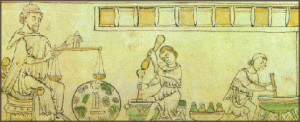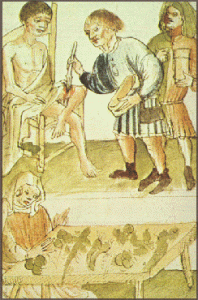Hello my beautiful lads and lasses,
Since the dawn of humans, we have been looking for ways to cure the various illnesses that afflict us. Especially since humans started gathering in large groups, there would be at least one person, usually male, who would treat patients with whatever knowledge existed at the time.
Scotland, of course, was not different. It’s actually important to mention that the very early Scot civilizations might have been much more advanced than we think!
Let’s see a breakdown of Celtic Medicine in the history of Scotland! 🙂

Monks weighing our medicine. Image source.
Early Medicine
When we say early medicine, we mean early! Little is known about the medical practices from when Scotland was nothing but scattered tribes and regional kings. However, what we do know, is that people would have used treatments based on folklore or rituals passed down through the generations. More specifically, they would rely a lot on seasons, astrology and legend. But of course, the Scotland of the time was influenced heavily by war and sword wounds; most medicine was applied on how to cure and prevent fermentation of injuries.
Primitive people in Scotland were highly capable of using quality flint tools and arrowheads, and demonstrated high levels of craftsmanship in working with the easily damaged flint. Of course, these were used in various fields, but primarily in war and medicine (two opposite ends, huh?). They most often used these tools in a procedure to cure evil or evil spirits in the head; they would cut open the head of the patient and then stitch it back together, using flint tools.
It is likely that wounds of all sorts would have been treated by the application of cooling and restorative plants and herbs, varying according to locality, season and the cosmological and astrological cycles. Among the plants used for treatments were water pimpernel, club moss and, of course, mistletoe, a plant potent and sacred to druids. Upon its symbolic importance, the plant was reputed to cure infertility and also to provide an anti-poison agent. We now use it to steal kisses at Christmas, hahah!

This man’s leg wound is being treated, while herbs for a soothing ointment or healing drink are being prepared. Image source.
The Dark Ages
Scotland in the Dark Ages was a mixture of Scots, Vikings, Celts, Romans and others. While there wasn’t, again, a unity in the healing practices, Christianism was made prevalent in the country by the Evangelists of the time, and influenced the way medicine was practiced. However, again, the healing practices were based a lot on seasons, and the phases of the moon. So, supernatural entities and Christian beliefs formed a hybrid of what would be medicine in Medieval Scotland!
For example, there was a very popular illustration among medical practitioners – the ‘zodiac man’. A representation of a human being, together with the symbols of the zodiac placed on the part of the body which would be affected if the individual became ill during the span of a particular sign. For example, if someone became ill in April, it meant that the neck would be affected, and therefore, should be cured. What an interesting, though, absurd idea that is!
Then, there was the notion of the ‘witch doctor’ – even though it would not have been called that, back then! (They used to burn the witches…). They could be either a man or a woman, who was believed to have the ‘gift’ of the healing practices. The healings they offered were derived from both the natural and supernatural world, and used a combination of incantation, ritual and the application or ingestion of herbal concoctions.
Plants used in Healing
Of course, it is much well-known, as was mentioned above, that Scots would use a lot of animal or plant based concoctions to heal wounds, fevers, ailments, etc. For example, you might remember Skara Brae – the oldest civilization found in Europe. The people living there used the iris plant, which is said to be used as an astringent, a purgative, a clotting agent and a cold cure! For anti-inflammation, they would use skullcap, for burns dead-nettle, and for rheumatism juniper. To be honest, I had to google them to see which plants they were, and I am still not sure I’ve seen them before! 😛
Of course, Scotland believed a lot in Healing Waters. The therapeutic uses of water, whether hot or cold, were many — bathing in it, drinking it either on its own or as part of a herbal tincture, pouring it from a height on the patient or applying it topically to the afflicted body part. The so-called ‘tea’ that they would drink for pleasure, they would also pour onto wounds and give patients to be treated for ailments. And to be honest, I think they were absolutely right. My grandma always said that nothing could feel better than a warm cup of tea when you are at your lowest. 🙂
Do you think most of the practices provided results, my dear?
Let me know what you think of the article in the comments!
Until next time…
Written by Lydia Kendall

 Share this book
Share this book